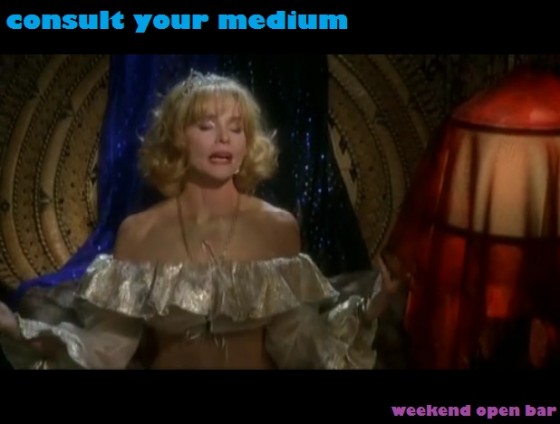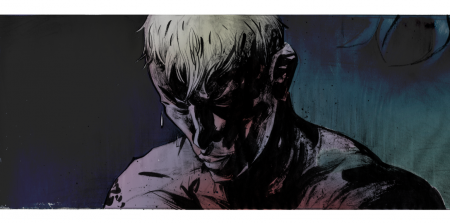#March2013
WEEKEND OPEN BAR: consult your medium
[WEEKEND OPEN BAR: The one-stop ramble-about-anything weekend post at OL. Comment on the topic at hand. Tell us how drunk you are. Describe a comic you bought. This is your chance to bring the party.]
I want you to consult your medium.
And I’m not talkin’ about that gargantuan-racked Gypsy babe you met at the bus stop. Do I think it’s righteous that she wore a revealing shawl and was jambox-blastin’ an Among the Living cassette? Yes. Do I think that she actually has psychic powers? No. Unless you like waking up in another state to find that you’ve been drugged, robbed, and’re wanted on an arson charge, you’re goin’ to want to stay away from her.
Trust me, I know from experience.
Anyways, the sort of medium we’re dealin’ with today ain’t of the supernatural variety. Well, not literally (we’ll come back to that). See, the word “medium” comes from the old-tyme Ancients’ expression for “in the middle.” As such, there’re a whole mess of ways to apply the term. Yes, that’s why when you go to Dunkin Donuts, the serving size of hot dirt-water that’s larger than the small but smaller than the large is called medium!
Ta-dah!
When takin’ a stroll across the Arts & Entertainment Dance Hall, we need to look at media as the ways in which creators express themselves. In a sense, any given medium is the means by which a transfer occurs from the mind of the Creator to the mind of the Viewer. It’s actually an alarmingly simple process: an idea is in the Creator’s mind, the Creator shapes some sort of artifact, the Viewer experiences said artifact, and now the same idea is in the Viewer’s mind! Voila!
Stephen King describes the process in On Writing:
Look — here’s a table covered with a red cloth. On it is a cage the size of a small fish aquarium. In the cage is a white rabbit with a pink nose and pink-rimmed eyes. In its front paws is a carrot-stub upon which it is contentedly munching. On its back, clearly marked in blue ink, is the numeral 8.
Do we see the same thing? We’d have to get together and compare notes to make absolutely sure, but I think we do. There will be necessary variations, of course…
I sent you a table with a red cloth on it, a cage, a rabbit, and the number eight in blue ink. You got them all, especially that blue eight. We’ve engaged in an act of telepathy. No mythy-mountain shit; real telepathy.
That’s right, you degenerate broads and bastard boozers clinging to the railing of Spaceship OL — every time you read a book or listen to an album or play a video game, you’re on the receiving end of some genuine telepathy! And when you find it in your soul to create some art? When you show someone the landscape you painted or the sonnet you penned? Yeah, you’ve got it — you’re on the transmitting end of the thought-transfer!
So what’s this all gettin’ at? Well, simply put, I want every goddamn one of you to declare your medium-allegiance. At the end of the day, in which art form are you most invested? Which mode of expression sweep-picks your heartstrings? What is it about this medium that gets your blood pumpin’ and spirit swirlin’?
[What is your medium of choice?]
There’s (Pulp)Hope for Media Theory!
In my younger and more volatile years, I tried really hard to be smart. I read intelligent stuff, used big words, and analyzed movies more than I watched them. Hey, we all make mistakes. Anyways, per the requirements of a media theory class, I once found myself reading Scott Bukatman’s Terminal Penetration. At the time, I was simply enthralled by Bukatman’s examination of the postmodern relationship between technology, consciousness, narrative, and virtual reality.
This theorist’s words spoke to me, encouraging me to scrutinize reality and the ways I experience it. However, the class ended, so I went back to drinking beers and playing MarioKart: Double Dash!! instead of worrying about the inevitable collapsing of reality as its paper-thin foundation crumbles.
Whatevs.
However, I have now learned that Paul Pope has contributed art for the 2nd edition of Scott Bukatman’s Blade Runner reader. As a diehard acolyte of the PULPHOPE, a fan of Harrison Ford’s most under-appreciated work, and a one-time student of media theory, I may just have to snag this book.
Punch it to hyperspace to see art, clips of the movie, and a video of Bukatman analyzing superheroes.
Matt Fraction – The Batman Dreams of Hieronymus Machines
Matt Fraction at w00tstock, ruminating upon the various meanings of comic books. He goes through his childhood experiences with comics, why comic books work as a medium, and how he went about killing a villain when he was first given the chance. This presentation is equal parts hilarious, insightful and entertaining.
If you like comics you must watch this.
Warren Ellis is a [Shivering] Genius
Warren Ellis is my goddamn hero.
In case you don’t have a clue, Warren Ellis is pretty much the comic industry’s best mad scientist. Not only is Ellis responsible for some of the best creator-owned properties of all time (Transmetropolitan & Doktor Sleepless come to mind), but he also pushes well-established properties into more compelling storylines. I’ve spent the last few years fawning over Ellis’ writing, going as far as to write a twenty-four page research paper exploring the implications of hyperreality in Doktor Sleepless.
But more than just the scribe behind some great funnybooks, Warren Ellis always has something interesting to say. Through his website, weekly columns and forum, the mad Englishman (aren’t they all?) offers a brand of insight that can only be understated as unique. Without reservation, Ellis tackles what he believes to be the trends/technologies/perspectives of the future while examining the precedents to which we so desperately cling.
For your pleasure, one of my favorite excerpts from Ellis’ 2001 collection of short essays/posts, Come in Alone:
Fuck superheroes, frankly. The notion that these things dominate an entire genre is absurd. It’s like every bookstore on the planet having ninety percent of its shelves filled by nurse novels. Imagine that. You want a new novel, but have to wade through three hundred new books about romances in the wards before you can get at any other genre. A medium where the relationship of fiction about nurses outweighs mainstream literary fiction by a ratio of one hundred to one. Superhero comics are like bloody creeping fungus, and they smother everything else. (p. 78)
Clearly, Warren Ellis is a creator devoted to the medium of comic books rather than the industry. And that’s a sentiment to which all artists should aspire.
Last week it was brought to my attention that pre-orders were being taken for Shivering Sands, Ellis’ new collection of essays, rants, reviews and other musings. At first glance, I figured that I would just snag the paperback at a bookstore; but then I realized that Shivering Sands is only available online. The author is experimenting with print-on-demand (yes, it is exactly what it sounds like) and therefore offering his newest compilation through Lulu. More than willing to give my (barely) hard-earned cash to Ellis, I ordered immediately and began anticipating the delivery.
My copy of Shivering Sands arrived last night. Despite being inundated with work, I have already blasted through the first sixty-some-odd pages. Seriously, I wish that I hadn’t already finished the media-component of my English degree because I would walk into the classroom wielding this book like Mjöllnir and smashing shit up with a ferocity that would make Thor piss his God-sized underoos. The examinations of technology and media are fucking mindblowing, delving into the notion (also found throughout Doktor Sleepless) that we are actually living in “the future,” but are incapable of recognizing it as such.
Another early highlight is found in Microcast, a January 2004 theorizing of why 2003 was an absolute dud in terms of mainstream entertainment/art. Ellis posits that niche broadcasting and narrowcasting in the digital era allows for the user to reverse the once unilateral transmission of information; in other words, users are now looking for what they want to find rather than accepting what they are given.
Ellis muses,
The mass audience is breaking down into smaller sets; and beyond that, into what Dr. Joshua Ellis (no relation) terms ‘taste tribes’ — people whose group status is defined by their particular cultural apprehension. Where one says, I know and interact with this person on the initial basis that we share tastes. Not that we all trade notes on Star Trek — not a fan thing — but that we share a cultural sphere. This creates and defines a loose community of its own, stitched together by cultural communication. And with the net in place, taste tribes are borderless. (p. 40)
I’m not even finished with Shivering Sands but I’m going to suggest that you purchase it. If you’re at all interested in comic books, media theory, chemically-induced diatribes, supporting great artists or just finding something with which to pass some time, check this book out.






